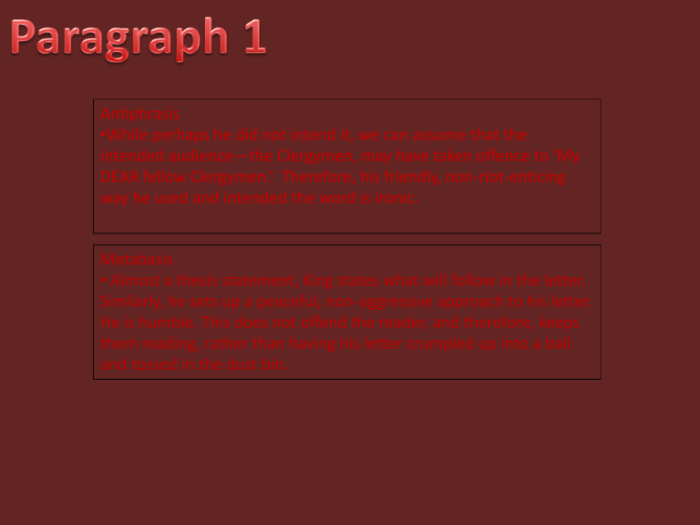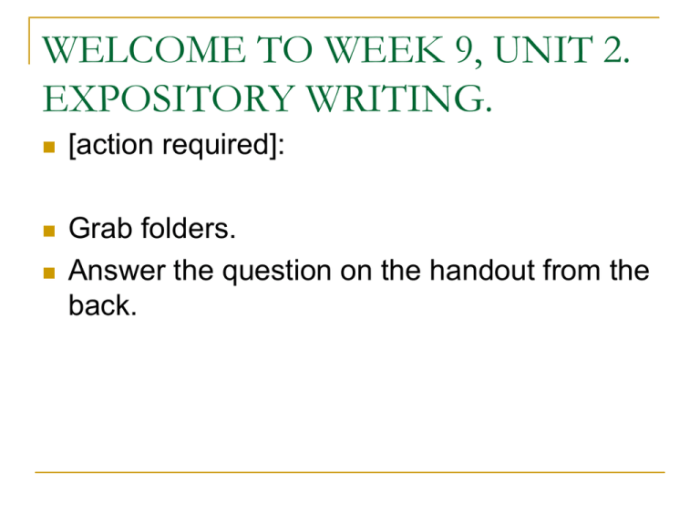Repetition in letter from birmingham jail – In Martin Luther King Jr.’s seminal Letter from Birmingham Jail, repetition emerges as a pivotal rhetorical device, shaping the letter’s structure, emotional impact, and persuasive power.
Through repeated words, phrases, and sentences, King amplifies his arguments, evokes strong emotions, and establishes a profound connection with his audience.
Rhetorical Devices

Repetition is a significant rhetorical device in King’s letter, enhancing its emotional impact and persuasiveness. King employs repeated words, phrases, and sentences to create emphasis, establish connections, and drive his arguments home.
Repeated Words and Phrases, Repetition in letter from birmingham jail
- The repetition of “unjust laws” highlights the systemic nature of racial discrimination and its pervasive effects.
- King’s repeated use of “nonviolent resistance” emphasizes his commitment to peaceful protest and his rejection of violence.
Repeated Sentences
- The repeated sentence “I have waited” conveys a sense of urgency and frustration, underscoring the need for immediate action.
- King’s repetition of “We will not be satisfied” builds momentum and creates a powerful call to action.
Structural Organization
Repetition contributes to the structural organization of the letter by creating emphasis, transitions, and logical connections.
Emphasis
King uses repetition to highlight key points and reinforce his arguments. For example, he repeats the phrase “Letter from Birmingham Jail” to emphasize the significance of the document and its message.
Transitions
Repetition serves as a transitional device, linking different sections of the letter and providing a sense of continuity. King often repeats key words or phrases to bridge paragraphs and maintain the flow of his argument.
Logical Connections
King uses repetition to establish logical connections between his ideas. By repeating certain words or phrases, he creates a sense of coherence and unity throughout the letter.
Biblical and Historical Allusions
King incorporates biblical and historical allusions through repetition, strengthening his arguments and connecting with the audience’s shared values.
Biblical Allusions
- King’s repeated references to the “Exodus” and “the Promised Land” evoke the biblical narrative of liberation and hope, resonating with the African American struggle for civil rights.
- The repetition of “Pharaoh” and “Moses” draws parallels between the biblical figures and the contemporary oppressors and leaders of the civil rights movement.
Historical Allusions
- King’s repetition of the phrase “I have a dream” recalls his famous “I Have a Dream” speech, evoking the power of collective aspiration and the vision of a just society.
- The repeated mention of “the Declaration of Independence” emphasizes the foundational principles of American democracy and the inherent rights of all citizens.
Emotional Appeal

Repetition evokes emotions in the reader, intensifying the emotional impact of King’s call for justice and equality.
Repeated Phrases
- The repetition of “unjust laws” and “nonviolent resistance” stirs feelings of anger and frustration, as well as admiration for those who peacefully resist oppression.
- King’s repeated use of “I” and “we” creates a sense of intimacy and shared struggle, fostering a connection between the writer and the reader.
Emotional Intensity
The repetition of certain words and phrases creates an emotional crescendo, building intensity and urgency. King’s repeated calls for “freedom” and “justice” leave a lasting impression on the reader.
Call to Action: Repetition In Letter From Birmingham Jail

King uses repetition to emphasize the urgency and importance of his message and motivate readers to take action.
Repeated Calls
- King’s repeated calls for “nonviolent resistance” and “civil disobedience” serve as a direct appeal to the reader to participate in the struggle for civil rights.
- The repetition of “now” and “the time is always right” conveys a sense of urgency and encourages immediate action.
Motivating Readers
By repeating his calls to action, King motivates readers to overcome fear and apathy and join the fight for justice. His words inspire a sense of responsibility and empower readers to make a difference.
General Inquiries
How does repetition contribute to the structural organization of the letter?
King uses repetition to create emphasis, transitions, and logical connections, enhancing the letter’s flow and readability.
What biblical and historical allusions does King incorporate through repetition?
King draws upon biblical passages and historical events to strengthen his arguments and connect with the shared values of his audience, enhancing the credibility and authority of his message.
How does repetition evoke emotions in the reader?
King’s repeated use of phrases like “unjust laws” and “nonviolent resistance” intensifies the emotional impact of his call for justice and equality.